Terry Yue Zhuo
Secure Code Generation via Online Reinforcement Learning with Vulnerability Reward Model
Feb 07, 2026Abstract:Large language models (LLMs) are increasingly used in software development, yet their tendency to generate insecure code remains a major barrier to real-world deployment. Existing secure code alignment methods often suffer from a functionality--security paradox, improving security at the cost of substantial utility degradation. We propose SecCoderX, an online reinforcement learning framework for functionality-preserving secure code generation. SecCoderX first bridges vulnerability detection and secure code generation by repurposing mature detection resources in two ways: (i) synthesizing diverse, reality-grounded vulnerability-inducing coding tasks for online RL rollouts, and (ii) training a reasoning-based vulnerability reward model that provides scalable and reliable security supervision. Together, these components are unified in an online RL loop to align code LLMs to generate secure and functional code. Extensive experiments demonstrate that SecCoderX achieves state-of-the-art performance, improving Effective Safety Rate (ESR) by approximately 10% over unaligned models, whereas prior methods often degrade ESR by 14-54%. We release our code, dataset and model checkpoints at https://github.com/AndrewWTY/SecCoderX.
To Defend Against Cyber Attacks, We Must Teach AI Agents to Hack
Feb 01, 2026Abstract:For over a decade, cybersecurity has relied on human labor scarcity to limit attackers to high-value targets manually or generic automated attacks at scale. Building sophisticated exploits requires deep expertise and manual effort, leading defenders to assume adversaries cannot afford tailored attacks at scale. AI agents break this balance by automating vulnerability discovery and exploitation across thousands of targets, needing only small success rates to remain profitable. Current developers focus on preventing misuse through data filtering, safety alignment, and output guardrails. Such protections fail against adversaries who control open-weight models, bypass safety controls, or develop offensive capabilities independently. We argue that AI-agent-driven cyber attacks are inevitable, requiring a fundamental shift in defensive strategy. In this position paper, we identify why existing defenses cannot stop adaptive adversaries and demonstrate that defenders must develop offensive security intelligence. We propose three actions for building frontier offensive AI capabilities responsibly. First, construct comprehensive benchmarks covering the full attack lifecycle. Second, advance from workflow-based to trained agents for discovering in-wild vulnerabilities at scale. Third, implement governance restricting offensive agents to audited cyber ranges, staging release by capability tier, and distilling findings into safe defensive-only agents. We strongly recommend treating offensive AI capabilities as essential defensive infrastructure, as containing cybersecurity risks requires mastering them in controlled settings before adversaries do.
Terminal-Bench: Benchmarking Agents on Hard, Realistic Tasks in Command Line Interfaces
Jan 17, 2026Abstract:AI agents may soon become capable of autonomously completing valuable, long-horizon tasks in diverse domains. Current benchmarks either do not measure real-world tasks, or are not sufficiently difficult to meaningfully measure frontier models. To this end, we present Terminal-Bench 2.0: a carefully curated hard benchmark composed of 89 tasks in computer terminal environments inspired by problems from real workflows. Each task features a unique environment, human-written solution, and comprehensive tests for verification. We show that frontier models and agents score less than 65\% on the benchmark and conduct an error analysis to identify areas for model and agent improvement. We publish the dataset and evaluation harness to assist developers and researchers in future work at https://www.tbench.ai/ .
An Empirical Study of Vulnerabilities in Python Packages and Their Detection
Sep 04, 2025Abstract:In the rapidly evolving software development landscape, Python stands out for its simplicity, versatility, and extensive ecosystem. Python packages, as units of organization, reusability, and distribution, have become a pressing concern, highlighted by the considerable number of vulnerability reports. As a scripting language, Python often cooperates with other languages for performance or interoperability. This adds complexity to the vulnerabilities inherent to Python packages, and the effectiveness of current vulnerability detection tools remains underexplored. This paper addresses these gaps by introducing PyVul, the first comprehensive benchmark suite of Python-package vulnerabilities. PyVul includes 1,157 publicly reported, developer-verified vulnerabilities, each linked to its affected packages. To accommodate diverse detection techniques, it provides annotations at both commit and function levels. An LLM-assisted data cleansing method is incorporated to improve label accuracy, achieving 100% commit-level and 94% function-level accuracy, establishing PyVul as the most precise large-scale Python vulnerability benchmark. We further carry out a distribution analysis of PyVul, which demonstrates that vulnerabilities in Python packages involve multiple programming languages and exhibit a wide variety of types. Moreover, our analysis reveals that multi-lingual Python packages are potentially more susceptible to vulnerabilities. Evaluation of state-of-the-art detectors using this benchmark reveals a significant discrepancy between the capabilities of existing tools and the demands of effectively identifying real-world security issues in Python packages. Additionally, we conduct an empirical review of the top-ranked CWEs observed in Python packages, to diagnose the fine-grained limitations of current detection tools and highlight the necessity for future advancements in the field.
EffiBench-X: A Multi-Language Benchmark for Measuring Efficiency of LLM-Generated Code
May 19, 2025
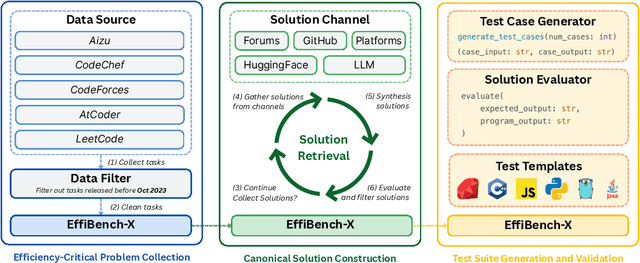


Abstract:Existing code generation benchmarks primarily evaluate functional correctness, with limited focus on code efficiency and often restricted to a single language like Python. To address this gap, we introduce EffiBench-X, the first multi-language benchmark designed to measure the efficiency of LLM-generated code. EffiBench-X supports Python, C++, Java, JavaScript, Ruby, and Golang. It comprises competitive programming tasks with human-expert solutions as efficiency baselines. Evaluating state-of-the-art LLMs on EffiBench-X reveals that while models generate functionally correct code, they consistently underperform human experts in efficiency. Even the most efficient LLM-generated solutions (Qwen3-32B) achieve only around \textbf{62\%} of human efficiency on average, with significant language-specific variations. LLMs show better efficiency in Python, Ruby, and JavaScript than in Java, C++, and Golang. For instance, DeepSeek-R1's Python code is significantly more efficient than its Java code. These results highlight the critical need for research into LLM optimization techniques to improve code efficiency across diverse languages. The dataset and evaluation infrastructure are submitted and available at https://github.com/EffiBench/EffiBench-X.git and https://huggingface.co/datasets/EffiBench/effibench-x.
Less is More: Towards Green Code Large Language Models via Unified Structural Pruning
Dec 20, 2024Abstract:The extensive application of Large Language Models (LLMs) in generative coding tasks has raised concerns due to their high computational demands and energy consumption. Unlike previous structural pruning methods designed for classification models that deal with lowdimensional classification logits, generative Code LLMs produce high-dimensional token logit sequences, making traditional pruning objectives inherently limited. Moreover, existing single component pruning approaches further constrain the effectiveness when applied to generative Code LLMs. In response, we propose Flab-Pruner, an innovative unified structural pruning method that combines vocabulary, layer, and Feed-Forward Network (FFN) pruning. This approach effectively reduces model parameters while maintaining performance. Additionally, we introduce a customized code instruction data strategy for coding tasks to enhance the performance recovery efficiency of the pruned model. Through extensive evaluations on three state-of-the-art Code LLMs across multiple generative coding tasks, the results demonstrate that Flab-Pruner retains 97% of the original performance after pruning 22% of the parameters and achieves the same or even better performance after post-training. The pruned models exhibit significant improvements in storage, GPU usage, computational efficiency, and environmental impact, while maintaining well robustness. Our research provides a sustainable solution for green software engineering and promotes the efficient deployment of LLMs in real-world generative coding intelligence applications.
BigCodeBench: Benchmarking Code Generation with Diverse Function Calls and Complex Instructions
Jun 26, 2024



Abstract:Automated software engineering has been greatly empowered by the recent advances in Large Language Models (LLMs) for programming. While current benchmarks have shown that LLMs can perform various software engineering tasks like human developers, the majority of their evaluations are limited to short and self-contained algorithmic tasks. Solving challenging and practical programming tasks requires the capability of utilizing diverse function calls as tools to efficiently implement functionalities like data analysis and web development. In addition, using multiple tools to solve a task needs compositional reasoning by accurately understanding complex instructions. Fulfilling both of these characteristics can pose a great challenge for LLMs. To assess how well LLMs can solve challenging and practical programming tasks, we introduce Bench, a benchmark that challenges LLMs to invoke multiple function calls as tools from 139 libraries and 7 domains for 1,140 fine-grained programming tasks. To evaluate LLMs rigorously, each programming task encompasses 5.6 test cases with an average branch coverage of 99%. In addition, we propose a natural-language-oriented variant of Bench, Benchi, that automatically transforms the original docstrings into short instructions only with essential information. Our extensive evaluation of 60 LLMs shows that LLMs are not yet capable of following complex instructions to use function calls precisely, with scores up to 60%, significantly lower than the human performance of 97%. The results underscore the need for further advancements in this area.
XFT: Unlocking the Power of Code Instruction Tuning by Simply Merging Upcycled Mixture-of-Experts
Apr 23, 2024



Abstract:We introduce XFT, a simple yet powerful training scheme, by simply merging upcycled Mixture-of-Experts (MoE) to unleash the performance limit of instruction-tuned code Large Language Models (LLMs). While vanilla sparse upcycling fails to improve instruction tuning, XFT introduces a shared expert mechanism with a novel routing weight normalization strategy into sparse upcycling, which significantly boosts instruction tuning. After fine-tuning the upcycled MoE model, XFT introduces a learnable model merging mechanism to compile the upcycled MoE model back to a dense model, achieving upcycled MoE-level performance with only dense-model compute. By applying XFT to a 1.3B model, we create a new state-of-the-art tiny code LLM (<3B) with 67.1 and 64.6 pass@1 on HumanEval and HumanEval+ respectively. With the same data and model architecture, XFT improves supervised fine-tuning (SFT) by 13% on HumanEval+, along with consistent improvements from 2% to 13% on MBPP+, MultiPL-E, and DS-1000, demonstrating its generalizability. XFT is fully orthogonal to existing techniques such as Evol-Instruct and OSS-Instruct, opening a new dimension for improving code instruction tuning. Codes are available at https://github.com/ise-uiuc/xft .
Aurora-M: The First Open Source Multilingual Language Model Red-teamed according to the U.S. Executive Order
Mar 30, 2024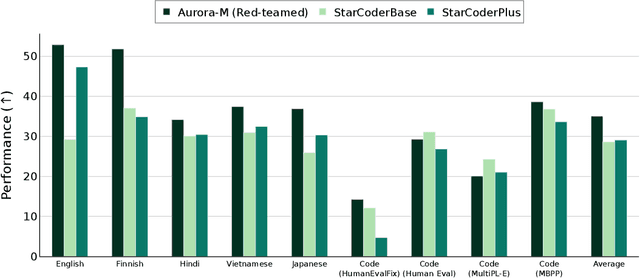

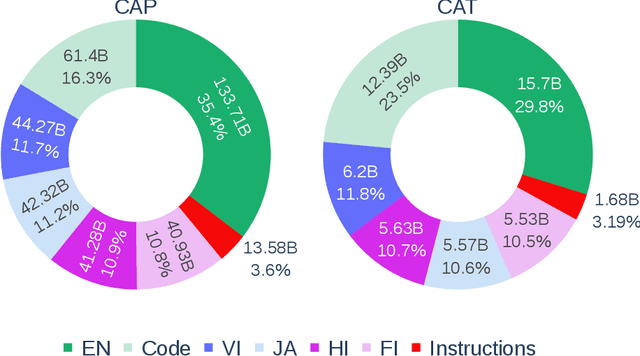

Abstract:Pretrained language models underpin several AI applications, but their high computational cost for training limits accessibility. Initiatives such as BLOOM and StarCoder aim to democratize access to pretrained models for collaborative community development. However, such existing models face challenges: limited multilingual capabilities, continual pretraining causing catastrophic forgetting, whereas pretraining from scratch is computationally expensive, and compliance with AI safety and development laws. This paper presents Aurora-M, a 15B parameter multilingual open-source model trained on English, Finnish, Hindi, Japanese, Vietnamese, and code. Continually pretrained from StarCoderPlus on 435 billion additional tokens, Aurora-M surpasses 2 trillion tokens in total training token count. It is the first open-source multilingual model fine-tuned on human-reviewed safety instructions, thus aligning its development not only with conventional red-teaming considerations, but also with the specific concerns articulated in the Biden-Harris Executive Order on the Safe, Secure, and Trustworthy Development and Use of Artificial Intelligence. Aurora-M is rigorously evaluated across various tasks and languages, demonstrating robustness against catastrophic forgetting and outperforming alternatives in multilingual settings, particularly in safety evaluations. To promote responsible open-source LLM development, Aurora-M and its variants are released at https://huggingface.co/collections/aurora-m/aurora-m-models-65fdfdff62471e09812f5407 .
StarCoder 2 and The Stack v2: The Next Generation
Feb 29, 2024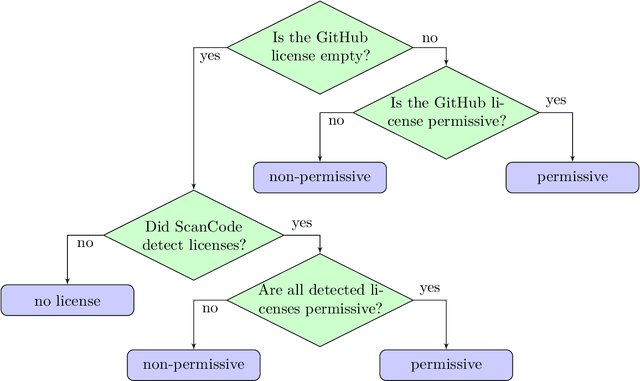
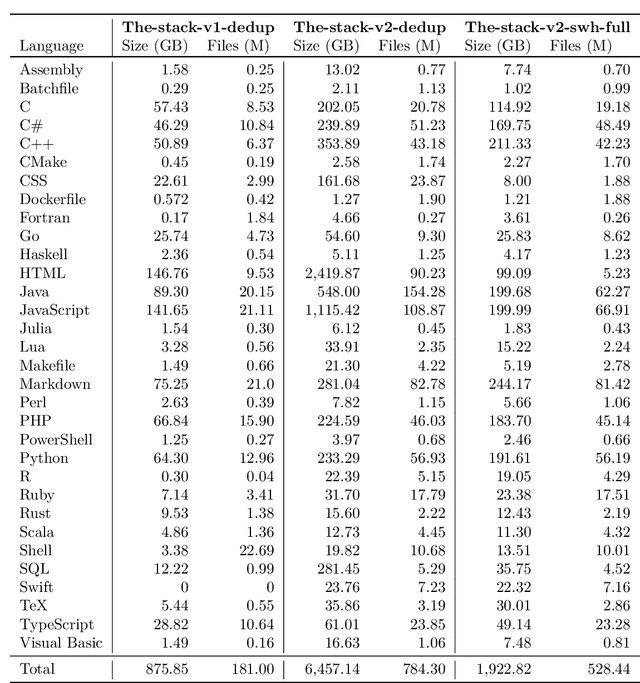
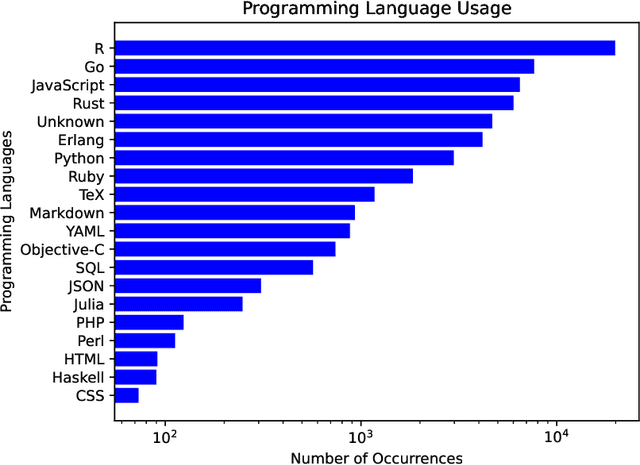
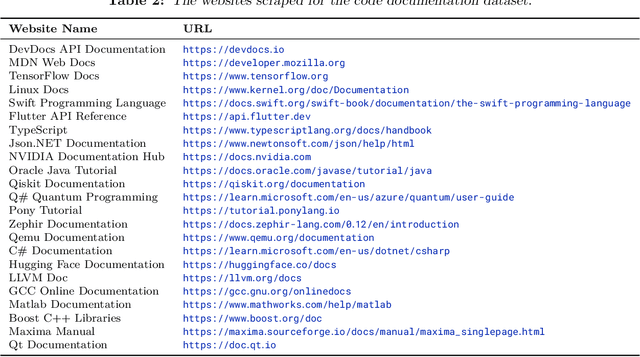
Abstract:The BigCode project, an open-scientific collaboration focused on the responsible development of Large Language Models for Code (Code LLMs), introduces StarCoder2. In partnership with Software Heritage (SWH), we build The Stack v2 on top of the digital commons of their source code archive. Alongside the SWH repositories spanning 619 programming languages, we carefully select other high-quality data sources, such as GitHub pull requests, Kaggle notebooks, and code documentation. This results in a training set that is 4x larger than the first StarCoder dataset. We train StarCoder2 models with 3B, 7B, and 15B parameters on 3.3 to 4.3 trillion tokens and thoroughly evaluate them on a comprehensive set of Code LLM benchmarks. We find that our small model, StarCoder2-3B, outperforms other Code LLMs of similar size on most benchmarks, and also outperforms StarCoderBase-15B. Our large model, StarCoder2- 15B, significantly outperforms other models of comparable size. In addition, it matches or outperforms CodeLlama-34B, a model more than twice its size. Although DeepSeekCoder- 33B is the best-performing model at code completion for high-resource languages, we find that StarCoder2-15B outperforms it on math and code reasoning benchmarks, as well as several low-resource languages. We make the model weights available under an OpenRAIL license and ensure full transparency regarding the training data by releasing the SoftWare Heritage persistent IDentifiers (SWHIDs) of the source code data.
 Add to Chrome
Add to Chrome Add to Firefox
Add to Firefox Add to Edge
Add to Edge